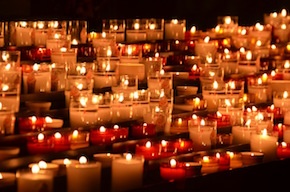I had to take a few weeks off from writing, and I was really looking forward to getting back to it. But this post is not at all what I had in mind. It’s been an incredibly trying few days for countless people who are finding themselves dumfounded and devastated in the wake of the mass shooting at Pulse nightclub in Orlando, Florida. Forty-nine innocent queer individuals and allies lost their lives, and the world is still reeling. I’m not yet able to fully articulate my thoughts and emotions about this horrific event, but I would be remiss if I didn’t take an opportunity to address what happened in some fashion. If you have been affected—as most of us have—by what happened in Orlando, I offer these suggestions:
- Give yourself permission to feel what you feel. Events like this one can stoke a number of unpleasant emotions. Feelings of anger, sadness, despair, fear, and defeat are common; and though it never feels good to keep company with those emotions, it’s important that you allow yourself to do it. Failing to attend to the natural emotions that arise when tragedy strikes can lead to what we in the mental health field call complicated grief. It can prolong the bereavement process and lead to the development of other, more chronic emotional and psychological challenges. Remember that all feelings are okay. Whatever emotions arise for you are completely valid—and like all emotions, they will eventually pass.
- Set limits on your media consumption. If you tune in to any form of media in the wake of a tragedy, you’re guaranteed to be inundated with images, videos, commentary, and debates that are, to some extent, informative but can become completely overwhelming if not limited. When a traumatic event occurs, it’s natural to want to seek information in an effort to make sense of what happened. But how much is too much? Social science researchers tell us that repeated exposure to tragic events through the media can result in vicarious trauma, a secondhand form of trauma that is incited and perpetuated by the flooding of imagery and information about a tragic event. It’s okay to inform yourself, but do it mindfully and in moderation.
- Seek the comfort of community. Connect with the people around you, and seek solace in the relationships you have with them. Find strength in togetherness, and lean in to the supportive structure that community provides. There’s something very soothing about recognizing that we’re all in this together. Do everything possible to remind yourself of that.
- Get involved. One of the most difficult things about coping with a tragedy is the feeling of helplessness it provokes. Knowing that people are suffering as a result of what happened can be troubling, especially if it feels like there’s nothing you can do about it. But in most cases, there are plenty of ways that you can make a difference in the lives of the people most affected by the tragic event. One of the greatest things about social media is that when disaster strikes, we can quickly and easily connect with people, organizations, and resources that will help us get involved and give in whatever ways we can. Volunteering your time or contributing in other ways—like giving blood, making financial contributions, donating necessary items, or building houses—is a helpful way to cope with the tragedy and regain a sense of hope.
- Talk to a professional. It isn’t always easy to recover from the shock and trauma of a tragic event. Everyone processes things differently, and how long it takes to feel okay again is completely unique to each individual. But while it’s normal to be affected, you should seek the help of a therapist or other professional if your functioning is impaired. Having someone to talk to about what you’re experiencing is incredibly important during times like these; through the support of a professional experienced in treating trauma, you can learn ways to cope effectively and manage to stay well.
Dealing with the emotional impact of a largescale tragedy is never easy. But it’s important that you find ways to adaptively cope and take care of yourself. Try to keep your hope alive, and remember that you are not alone. Give yourself permission to grieve, and then gather your strength and continue living. The world needs you. Be well, today and always.

